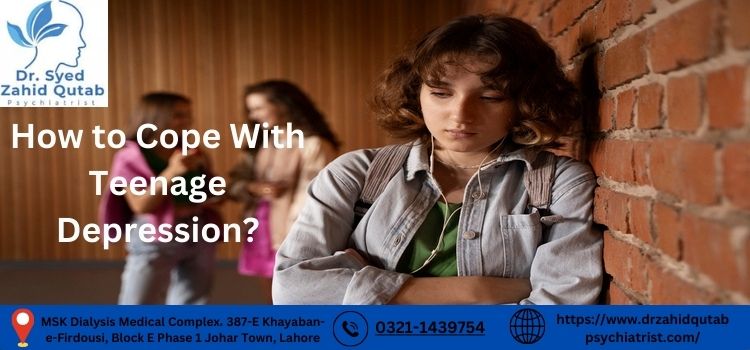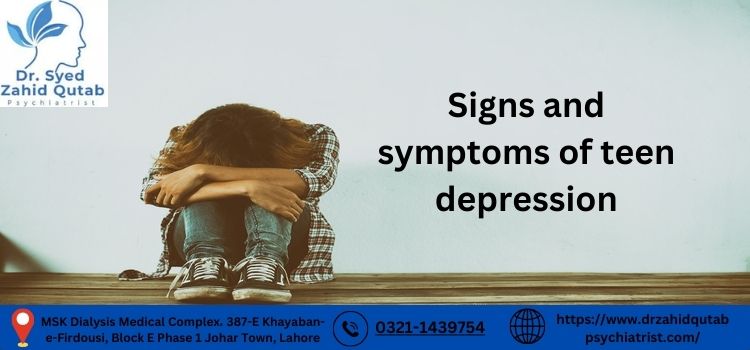How to cope with teenage depression? Dealing with teenage depression can often seem like an impossible task, but it doesn’t have to be. So how to cope with teenage depression. With the right guidance and resources, anyone struggling with this mental health issue can start on the path to understanding their feelings more deeply and finding lasting ways to cope.
Whether you’re a teen yourself or a parent of one, understanding symptoms, triggers, treatments, and support options available is essential for being able to identify when help is needed — and get that help!
Read more to get further details to know How to cope with teenage depression?
How to Cope With Teenage Depression?

When it comes to dealing with teenage depression, it can be hard to know what to do. Most of people want to know How to cope with teenage depression? So, Here are some tips for helping teens cope with depression:
Talk About It:
Encourage your teen to open up about their feelings and talk through any problems they might have. Let them know that it’s okay to feel the way they do, and that you’re there to listen.
Take Time Out:
Encourage your teen to take time out for themselves and find activities that help them relax. This could be anything from going for a walk, to practicing meditation or yoga, to listening to music. Anything that helps take their mind off of the worries and stresses of everyday life can be beneficial.
Reach Out for Help:
Connecting with professionals, such as therapists or doctors, can be really helpful in treating teen depression. They’ll have the expertise to help your teen work through their issues and develop coping strategies that will last.
Develop Healthy Habits:
Eating a balanced diet, exercising regularly, and getting enough sleep can all help to improve mood and energy levels. Encourage your teen to find activities that they enjoy, such as sports or music.
Avoid Drugs and Alcohol:
Substance use is never a good way of managing depression. It can lead to more serious mental health issues down the line, so it’s best to avoid them altogether.
Create a Support Network:
Ask your teen if there are any friends or family members that they trust and feel comfortable talking to. Having a support network can make it easier for them to open up and share their feelings.
Keeping in the view of above points now you will not ask how to cope with teenage depression?
Signs and Symptoms of Teen Depression

It can be hard to tell if a teen is struggling with depression or not. Some of the signs and symptoms of teenage depression include:
- Feelings of sadness, hopelessness, or emptiness that last for two weeks or more
- Disinterest in activities or hobbies they once enjoyed
- Problems with concentration and focus
- Changes in- Sleeping patterns, such as difficulty falling asleep or oversleeping
- Irritability and angry outbursts
- Low self-esteem
- Aches and pains without a source of physical illness
- Thoughts of death or suicide.
If you notice any of these signs in your teen, it’s important to reach out for help.
Causes and Risk Factors
The exact cause of teen depression is unknown, but it can be triggered by a variety of factors, including:
Genetics: Certain genes can make people more prone to developing depression.
Life Stressors: Stressful situations such as bullying, abuse, or trauma can all contribute to the onset of depression.
Family History: If a parent or another close family member has depression, it increases the chances of a teen developing it.
Brain Chemistry: Imbalances in hormones and neurotransmitters can play a role in depression.
Coping With Suicidal Thoughts

If your teen is having suicidal thoughts, it’s important to get them help right away. Reassure them that they can talk to you and encourage them to seek professional help. Monitor their behavior closely and make sure they are in a safe environment. There are several treatments available for teenage depression, including
Psychotherapy:
Talking through their feelings with a mental health professional can help teens better understand and cope with their depression.
Medications:
Certain medications can be used to reduce the symptoms of depression. It’s important to work closely with a doctor to find the best option for your teen.
Support Groups:
Joining a support group can help teens better understand and manage their depression. It can also provide a sense of belonging and understanding for those struggling with this mental health issue.
Healthy Lifestyle:
Engaging in healthy activities such as exercise, socializing, getting enough sleep, and eating nutritious meals can help teens cope with their depression in a positive way.
It’s important to remember that it takes time and effort to manage depression, but help is available. If your teen is struggling with depression, reach out for professional help and support. The sooner they get the help they need, the greater their chance of recovery.
Prevention Tips
While there is no surefire way to prevent teenage depression, there are several steps parents can take to reduce the risk:
Provide Support:
Encourage open communication and provide emotional support for your teen. Let them know that they can talk to you about anything without judgment or criticism.
Model Healthy Behavior:
Be a positive role model by engaging in healthy behaviors yourself, such as eating nutritious meals, exercising regularly, and managing stress in healthy ways.
Monitor Screen Time:
Limit the amount of time your teen spends on social media and encourage them to engage in offline activities.
Discuss Mental Health:
Talk openly with your teen about mental health and make sure they know that it’s okay to seek help if needed. Encourage them to take care of their emotional well-being.
Conclusion
Depression is a serious issue and it’s important to recognize the warning signs. Learn how to cope with teenage depression? Early intervention can help reduce the impact of teen depression and lead to greater recovery.
With the right guidance, resources, support, and healthy lifestyle choices, teens can work towards understanding their feelings more deeply and finding lasting ways to cope.
FAQs
Frequently asked questions by people are mentioned below:
How you can cope with depression in adolescence?
The best way to tackle teenage depression is to learn effective coping strategies that you can use in day-to-day life. Developing helpful habits, finding healthy ways to express your feelings, and talking about your worries with family or friends.
Is it okay for a 15 year old to be depressed?
Yes, it is okay. It’s not only normal for teenagers to experience periods of depression but it is also important to get help if these feelings linger for more than a few weeks.
Why is my 16 year old daughter so emotional?
It could be due to a number of reasons, such as hormonal changes or physical health issues. It is important to ask your daughter what they think might be causing their emotional distress. If the issue persists, it may be time to see a doctor or therapist for further help.
At what age do teenage mood swings stop?
Mood swings usually start around the age of 11-12 and tend to lessen in intensity as teens progress into adulthood. While moods will still fluctuate, it is common for most people to have a more stable emotional state by their late twenties.
